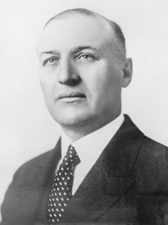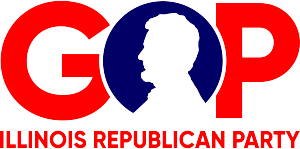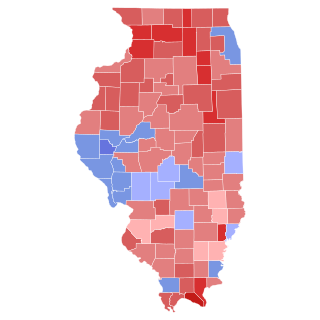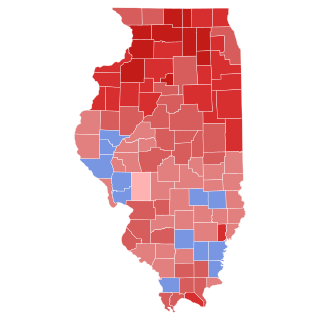
The Pineapple Primary was the name given to the primary election held in Illinois on April 10, 1928. The campaign was marked by numerous acts of violence, mostly in Chicago and elsewhere in Cook County. In the six months prior to the primary election, 62 bombings took place in the city, and at least two politicians were killed. The term "Pineapple Primary" originates with the contemporary slang term "pineapple" to describe a hand grenade.

The 1926 United States Senate elections were elections for the United States Senate that occurred in the middle of Republican President Calvin Coolidge's second term. The 32 seats of Class 3 were contested in regular elections, and special elections were held to fill vacancies. The Republican majority was reduced by seven seats.

Ruth McCormick, was an American politician, activist, and publisher. She served one term in the United States House of Representatives, winning an at-large seat in Illinois in 1928. She gave up the chance to run for re-election to seek a United States Senate seat from Illinois. She defeated the incumbent, Senator Charles S. Deneen, in the Republican primary, becoming the first female Senate candidate for a major party. McCormick lost the general election. A decade later, she became the first woman to manage a presidential campaign, although her candidate, Thomas E. Dewey, failed to capture his party's nomination.

Charles Samuel Deneen was an American lawyer and Republican politician who served as the 23rd Governor of Illinois, from 1905 to 1913. He was the first Illinois governor to serve two consecutive terms totalling eight years. He was governor during the infamous Springfield race riot of 1908, which he helped put down. He later served as a U.S. Senator from Illinois, from 1925 to 1931. Deneen had previously served as a member of the Illinois House of Representatives from 1892 to 1894. As an attorney, he had been the lead prosecutor in Chicago's infamous Adolph Luetgert murder trial.

Frank Leslie Smith was an Illinois politician.

Otis Ferguson Glenn was a Republican United States Senator from the State of Illinois.

The Illinois Republican Party is the affiliate of the Republican Party in the U.S. state of Illinois founded on May 29, 1856. It is run by the Illinois Republican State Central Committee, which consists of 18 members, one representing each of the state's congressional districts. Once the dominant party in Illinois, the state GOP has become a minority party within the last few decades, holding little power in the state. The current chairman is Don Tracy, who has served since 2021.
Both houses of the United States Congress have refused to seat new members based on Article I, Section 5 of the United States Constitution which states that:
"Each House shall be the judge of the elections, returns and qualifications of its own members, and a majority of each shall constitute a quorum to do business; but a smaller number may adjourn from day to day, and may be authorized to compel the attendance of absent members, in such manner, and under such penalties as each House may provide."

The 1932 United States Senate election in Illinois took place on November 8, 1932. Incumbent Republican Otis F. Glenn was unseated by Democrat William H. Dieterich.

The 1926 United States Senate election in Illinois took place on November 2, 1926.

The 1920 United States Senate election in Illinois took place on November 2, 1920.

The 1918 United States Senate election in Illinois took place on November 5, 1918.

The 1924 United States Senate election in Illinois took place on November 4, 1924.

The 1930 United States Senate election in Illinois took place on November 4, 1930.

The United States Senate election in Illinois of 1954 took place on November 2, 1954. Incumbent Democratic United States Senator Paul Douglas was reelected to a second term.

In the Chicago mayoral election of 1915, Republican William Hale Thompson defeated Democrat Robert Sweitzer.

Republican candidate Herbert Hoover won the state of Illinois in the 1928 United States presidential election, and would emerge victorious from the overall election. State voters chose 29 representatives, or electors, to the Electoral College, who voted for president and vice president.

The 1912 Illinois gubernatorial election was held on November 5, 1912. Incumbent second-term Republican governor Charles S. Deneen was defeated by Democratic nominee, former mayor of Chicago Edward Fitzsimmons Dunne.

Elections were held in Illinois on Tuesday, November 5, 1940.

Isaac Newton Jenkins was an American attorney, soldier, and political candidate. A perennial candidate for political office, Jenkins ran for office in Illinois many times. He originally ran as a Robert La Follette-aligned progressive member of the Republican Party in the 1920s. Beginning in the mid-1930s, Jenkins publicly espoused antisemitic and fascist views and aligned himself with Adolf Hitler and other Nazis. He associated with other American pro-fascists. He was a figure in the short-lived Union Party, and served as the director of William Lemke's 1936 campaign as the party's presidential nominee.



















